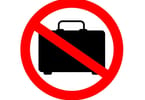Airline gift cards can be an easy way to give the gift of travel in a neat little package. Anyone considering giving one of these cards as a gift, though, should check the terms and conditions ahead of time, be careful when choosing the airline and make sure the recipient will use it.
“You have to make sure the card you get is convenient for the recipient,” says travel expert Marybeth Bond, who offers travel tips on her Web site. “But the nice thing is that a gift card offers flexibility — you can use it to buy a ticket to anywhere.”
Though retail gift cards have been around for more than a decade, airline gift cards are relatively new. About six domestic airlines — many of which already were selling paper or electronic gift certificates — started offering gift cards in the past few years. In most cases, buyers of airline gift cards don’t have to worry about the major snags associated with some retail gift cards: Most airline cards do not expire or diminish in value if the card goes unused, even for years.
There are still catches and restrictions to watch out for, though, and even questions about whether a gift card still will be good if an airline goes bankrupt or merges. So, here’s a guide to the ins and outs of using airline gift cards.
The best way to buy
Walk into a major discount store, grocery store or warehouse club, and you might see airline gift cards hanging near the checkout. However, it’s best to resist the urge to make an impulse purchase, experts say. “The best place to buy them is on the airline’s Web site,” says gift card expert Kwame Kuadey, CEO of the gift-card swapping site GiftCardRescue.com. “If you buy them in a store, they only come in very small denominations, and $50 or $100 is really just a down payment on a ticket.”
Purchasing multiple cards would be an option — though maybe an awkward one, since the recipient would have to keep track of all that plastic — but most airlines put restrictions on the number of cards that can be used for the purchase of a single ticket. “One question to ask the airline is whether you can redeem multiple cards when booking a single ticket,” Kuadey says.
Buying the card on an airline’s Web site also offers added security. Web sites that specialize in selling gift cards hawk airline gift cards at a discount — so do individuals on Craigslist and eBay — but just about all airlines’ terms and conditions warn that cards purchased anywhere but through the airline or an authorized retailer might not be valid.
After purchasing a gift card on an airline’s Web site, the buyer typically has several shipping options for the card — usually standard, two-day or overnight shipping for a charge of between $3 and $15. Or, some airlines offer the free option of giving a “virtual card” — an e-mail sent to the recipient with a card number and PIN number.
Watch out for pitfalls
Travel experts say the biggest mistake the giver of an airline gift card can make is choosing the wrong airline. To avoid that, pick an airline the recipient flies frequently or one that has a nearby hub or offers a large number of flights in and out of the major airport closest to the recipient’s home, Bond recommends. “If you have a specific trip in mind, check the routes ahead of time,” Bond says.
BestFares.com CEO Tom Parsons, a budget travel expert who has been in the travel business for 27 years, says being locked into one airline can still cause problems. For one, another airline might be offering a bargain flight to the cardholder’s chosen destination. Also, the airline might charge extra fees that the gift card recipient will have to pay out-of-pocket. “There might be a baggage fee, a kid-flies-solo fee, change fees, a charge for a blanket and $3 for a soda pop,” Parsons says. So, checking the airline’s baggage and other fees before your purchase is a good idea.
Consumer advocates say another risk of airline gift cards is that some airlines state in their terms and conditions that they will not freeze funds on and replace a lost or stolen card. “Beware. If your card is lost or stolen, you could either be in for a big hassle — or out of luck,” says Jack Gillis, director of public affairs with the Consumer Federation of America. Gift card expert Kuadey agrees: “These are high-value gifts, so you want to make sure the card is replaceable.”
If you’re giving an airline gift card — especially to someone who might not use it right away — a possible future airline bankruptcy also could be an issue. “If an airline goes bankrupt, it’s hard to predict whether it will be easy for you to get your money,” Gillis says. “So, before you buy, think about, ‘How solvent is that airline?'”
Giving the gift
In tough economic times, an airline gift card can provide the luxury of travel for someone who might not otherwise be able to afford it. But an airline gift card isn’t for everyone. For example, it might not be right to give to someone who is on too tight a budget to pay for a hotel or restaurant meals. “You might have a $300 gift card, but if you don’t have the other money for a trip, the card might just sit around,” Kuadey says.
Instead, experts recommend giving an airline gift card to someone who is travel-savvy or who is planning a specific trip but hasn’t yet purchased tickets. It can also work for a friend or relative who has always wanted to go to a particular place but needs a nudge to actually take the big step and plan something. “It wouldn’t be as good a gift for people who don’t have the habit of traveling,” Bond says.
Giving an airline gift card did work well for writer and designer Tamela Terry, who recently chipped in with her sister on a $200 American Airlines card for their mother’s birthday. Terry’s mother used the gift to fly from Texas to Maryland for a family party. “It was easy peasy — completely painless,” Terry says. There was a downside, though. Terry and her sister chose to have the card number and PIN sent via e-mail to avoid a shipping fee, so the presentation was not impressive. Terry says: “It was pretty underwhelming.”
Even opening a plastic gift card can seem impersonal, but experts say you can get around that with creative presentation. Gift expert Leah Ingram, author of “Gifts Anytime: How to Find the Perfect Present for Any Occasion,” who offers tips on her Web site GiftsandEtiquette.com, suggests perusing online auction sites for an unusual flight-related item, such as a vintage airline bag, and adding little extras that could come in handy on a trip — chewing gum, hand sanitizer, a map, travel-sized toiletries — along with the gift card.
“Get anything you can think of that screams airport or airplane and put it in a kitschy bag or even buy a cute new carry-on bag,” Ingram says. “You can really make it fun.”
6 things to consider when buying an airline gift card or gift certificate
Before airline gift cards became available a few years ago, gift certificates provided a way to buy air travel for someone else. Some airlines still don’t offer gift cards but do offer gift certificates, while others offer a choice. Here are some things to consider when trying to decide between a gift card and a gift certificate:
1. A gift certificate might be more likely to have an expiration date. Certificates offered by Continental Airlines and Delta — which do not offer gift cards — are good for one year from the date of purchase. Northwest Airlines’ gift certificates used to expire after one year, but gift certificates purchased after August 2007 do not expire.
2. While most gift cards are non-refundable, some gift certificates are refundable — though only before the expiration date and sometimes for a fee. Delta, for example, allows refunds but charges a penalty of 10 percent of the face value of the certificate. Northwest offers refunds — but only to the credit or debit card that was used to purchase the certificate. Continental, however, doesn’t offer refunds.
3. As with gift cards, the maximum dollar amount of a gift certificate varies from airline to airline. Continental Airlines, for example, offers gift certificates up to $10,000, while the maximum available from both Midwest and Northwest is $500.
4. Most gift certificates, like most cards, are transferable to another person. However, if there’s any chance the recipient might not use the certificate, it’s a good idea to double check.
5. Places where gift certificates can be redeemed vary from airline to airline. Some are redeemable online, but some are not. Cards typically cannot be redeemed through a travel agent, but some gift certificates can.
6. Some airlines do not offer a paper gift certificate option and instead send the certificate by e-mail, so there’s no physical gift for the recipient to open.






















